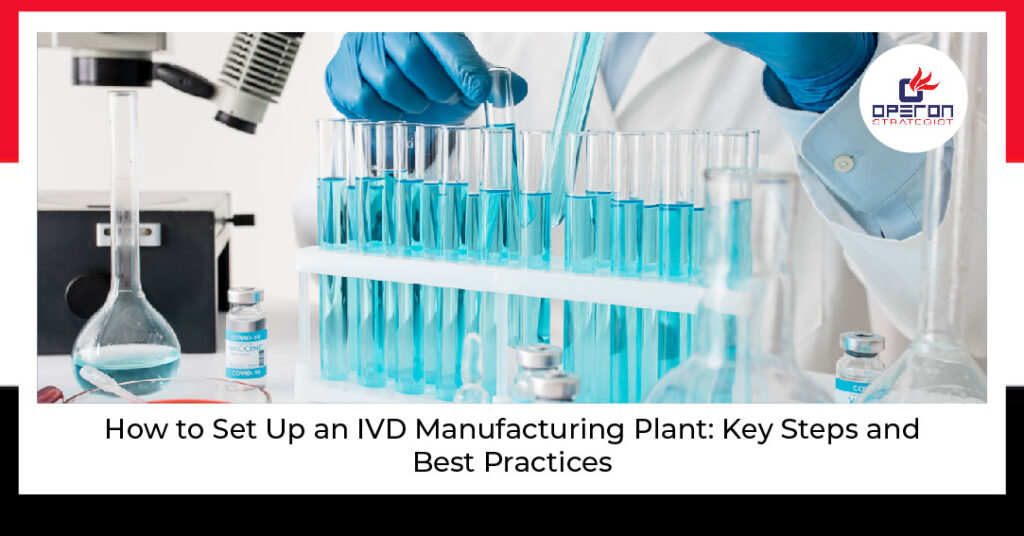Why Egypt is Emerging as a Hub for IVD Manufacturing?
The In Vitro Diagnostic (IVD) manufacturing industry in Egypt is witnessing significant growth, driven by rising healthcare needs, increasing demand for accurate diagnostic solutions, and strong government initiatives supporting local production. As Egypt positions itself as a regional leader in healthcare innovation, IVD manufacturing has become a crucial sector that bridges patient care with technological advancement.
However, establishing an IVD manufacturing plant goes far beyond setting up a production line. It requires a deep understanding of strict regulatory frameworks, advanced facility and cleanroom design, validated processes, and a robust quality management system that meets international standards. With proper planning and expert guidance, manufacturers can successfully navigate these challenges, achieve faster compliance, and secure long-term market success in Egypt’s evolving medical device landscape.
Let's Grow Your Business Together
Understanding Regulatory Requirements for IVD Manufacturing in Egypt
Before setting up your plant, you must comply with the Egyptian Drug Authority (EDA) regulations for medical devices and IVDs. Approval from EDA is mandatory for manufacturing, importing, or distributing IVDs in the country.
Key points to consider:
- Registration of IVD products with the EDA.
- Meeting international standards such as ISO 13485 for Quality Management Systems.
- Aligning with EU-IVDR (2017/746) and FDA requirements if you plan to export.
- Maintaining proper documentation, including Design Dossier and Technical File.
Compliance ensures your IVD products are legally marketable, safe, and globally accepted.
Facility Layout and Cleanroom Design in IVD Manufacturing
The facility layout is the backbone of any IVD manufacturing plant. A well-designed plant improves productivity, minimizes contamination risks, and ensures regulatory compliance.
Key considerations include:
- Segregated areas for raw materials, production, and finished goods.
- Designing ISO-classified cleanrooms for sterile processes.
- Controlled environments with air filtration, humidity, and temperature control.
- Optimized workflow to prevent cross-contamination.
A properly structured facility ensures smooth operations and long-term scalability.
Equipment and Technology for IVD Manufacturing
Selecting the right equipment is critical for high-quality and consistent IVD production. Modern IVD manufacturing relies on advanced automation and precise testing systems.
Essential equipment may include:
- Reagent filling and packaging machines.
- Automated analyzers for quality testing.
- Calibration and validation instruments.
- Sterilization and contamination-control systems.
Investment in modern technology not only improves efficiency but also reduces human error and ensures compliance with international quality standards.
Quality Management System (QMS) for IVD Manufacturing
A robust QMS for IVD manufacturing is essential for meeting both EDA and international compliance standards.
QMS focus areas include:
- Implementation of ISO 13485.
- Risk management as per ISO 14971.
- CAPA (Corrective and Preventive Actions).
- Validation and verification of processes.
- Documentation control and audit readiness.
A strong QMS builds trust with regulators and healthcare providers while ensuring product safety and effectiveness.
How Operon Strategist Can Help in IVD Manufacturing in Egypt?
Setting up an IVD manufacturing plant in Egypt requires regulatory expertise, facility design knowledge, and compliance-driven systems. Operon Strategist provides end-to-end support tailored to the needs of medical device and IVD manufacturers.
Our services include:
- Guidance with EDA registration and regulatory approvals.
- Facility layout design and cleanroom setup.
- Support in implementing ISO 13485 and QMS compliance.
- Assistance in validation documentation, and audits.
- Strategic consulting for market entry in Egypt.
With our expertise, manufacturers can establish a compliant, efficient, and scalable IVD manufacturing facility while reducing time-to-market and regulatory risks.
Learn How to Achieve Faster EDA Approvals for IVD Products
FAQ'S
IVD manufacturing refers to the production of in vitro diagnostic devices used to detect diseases, monitor health conditions, or provide laboratory testing results. It involves stringent quality control, process validation, and adherence to regulatory standards.
IVD manufacturers in Egypt must comply with Egyptian Drug Authority (EDA) regulations, ISO 13485 for quality management, ISO 14971 for risk management, and Good Manufacturing Practices (GMP). Proper registration and licensing are mandatory for market approval.
Key requirements include a compliant facility layout, cleanroom classification, validated manufacturing processes, skilled workforce, quality management system implementation, and access to reliable raw materials.
Quality is ensured through process validation, equipment calibration, ISO 13485-compliant QMS, in-process and final product testing, and ongoing monitoring of production standards.
Operon Strategist provides end-to-end support including regulatory guidance, facility design, process validation, QMS implementation, and expert consultation to ensure compliance and faster market entry.

